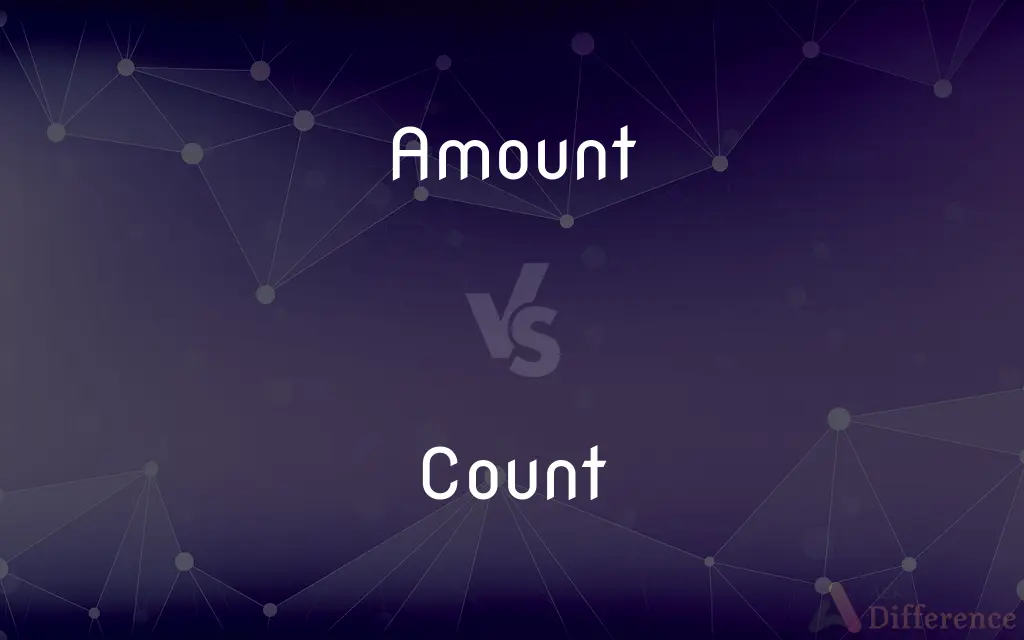Amount vs. Count — What's the Difference?
Edited by Tayyaba Rehman — By Urooj Arif — Updated on April 15, 2024
Amount refers to the quantity of non-countable nouns (like water or sand), while count pertains to the quantity of countable nouns (like apples or books).

Difference Between Amount and Count
Table of Contents
ADVERTISEMENT
Key Differences
Amount is used when referring to the total quantity of something that is typically measured rather than counted, such as rice, water, or flour. Whereas, count applies to items that can be enumerated individually, like cars, people, or coins.
In contexts involving measurements like volume, mass, or weight, the term amount is appropriate, reflecting quantities that aren't distinctly separable. On the other hand, count is ideal for discrete units or items that can be physically separated and tallied.
When discussing abstract concepts such as love or freedom, amount is the suitable term to describe the extent or degree. Conversely, count would be incorrect in these scenarios as these concepts cannot be quantified in discrete units.
Instructions in recipes or chemistry often use amount to specify ingredients like sugar or salt, which are added in measurements such as cups or grams. Count, however, is used when the recipe requires a number of items, like three eggs or two lemons.
In statistical or data analysis, amount might be used to describe total sums of money, areas, or other aggregable data, emphasizing a collective quantity. Count, on the other hand, is used when referring to data points that are distinct and countable, such as survey responses or population counts.
ADVERTISEMENT
Comparison Chart
Applicability
Non-countable nouns
Countable nouns
Examples
Sand, water, air
Apples, cars, people
Usage in Measurements
Volume, mass
Number of items
Abstract Concepts
Used (e.g., amount of joy)
Not used
Statistical Usage
Aggregated data
Discrete data points
Compare with Definitions
Amount
Used in financial contexts to mean sum of money.
The amount of the bill shocked her.
Count
The total number of countable items.
The count of students present was 30.
Amount
The total sum of something measurable.
The amount of data processed was enormous.
Count
In legal terms, a point of indictment.
He faced three counts of burglary.
Amount
In the sense of aggregate quantity.
The amount of pollution in the city is rising.
Count
A simple enumeration or tally.
His count of mistakes was far too high.
Amount
A quantity of non-countable substance.
The amount of milk in the glass was just enough for the recipe.
Count
For rhythm or timing purposes in music or dance.
Keep the count to maintain the rhythm.
Amount
The extent or degree of something.
They didn't know the amount of work required.
Count
Used in contexts of periodic assessment.
The yearly bird count helps track species health.
Amount
A quantity of something, especially the total of a thing or things in number, size, value, or extent
The substance is harmless if taken in small amounts
Sport gives an enormous amount of pleasure to many people
Count
Count (feminine: countess) is a historical title of nobility in certain European countries, varying in relative status, generally of middling rank in the hierarchy of nobility. The etymologically related English term "county" denoted the land owned by a count.
Amount
Come to be (the total) when added together
Losses amounted to over 10 million pounds
Count
To name or list (the units of a group or collection) one by one in order to determine a total; number.
Amount
The total of two or more quantities; the aggregate.
Count
To recite numerals in ascending order up to and including
Count three before firing.
Amount
A number; a sum.
Count
To include in a reckoning; take account of
Ten dogs, counting the puppies.
Amount
A principal plus its interest, as in a loan.
Count
To include by or as if by counting
Count me in.
Amount
The full effect or meaning; import.
Count
To exclude by or as if by counting
Count me out.
Amount
Quantity
A great amount of intelligence.
Count
To believe or consider to be; deem
Count yourself lucky.
Amount
To add up in number or quantity
The purchases amounted to 50 dollars.
Count
To recite or list numbers in order or enumerate items by units or groups
Counted by tens.
Amount
To add up in import or effect
That plan will never amount to anything.
Count
To have importance
You really count with me.
Amount
To be equivalent or tantamount
Accusations that amount to an indictment.
Count
To have a specified importance or value
Their opinions count for little. Each basket counts for two points.
Amount
The total, aggregate or sum of material not applicable to discrete numbers or units or items in standard English.
The amount of atmospheric pollution threatens a health crisis.
Count
(Music) To keep time by counting beats.
Amount
A quantity or volume.
Pour a small amount of water into the dish.
The dogs need different amounts of food.
Count
The act of counting or calculating.
Amount
The number (the sum) of elements in a set.
Count
A number reached by counting.
Amount
To total or evaluate.
It amounts to three dollars and change.
Count
The totality of specific items in a particular sample
A white blood cell count.
Amount
To be the same as or equivalent to.
He was a pretty good student, but never amounted to much professionally.
His response amounted to gross insubordination
Count
(Law) Any of the separate and distinct charges or causes of action in an indictment or complaint.
Amount
To go up; to ascend.
Count
(Sports) The counting from one to ten seconds, during which time a boxer who has been knocked down must rise or be declared the loser.
Amount
To go up; to ascend.
So up he rose, and thence amounted straight.
Count
(Baseball) The number of balls and strikes that an umpire has called against a batter.
Amount
To rise or reach by an accumulation of particular sums or quantities; to come (to) in the aggregate or whole; - with to or unto.
Count
A nobleman in some European countries.
Amount
To rise, reach, or extend in effect, substance, or influence; to be equivalent; to come practically (to); as, the testimony amounts to very little.
Count
Used as a title for such a nobleman.
Amount
To signify; to amount to.
Count
(intransitive) To recite numbers in sequence.
Amount
The sum total of two or more sums or quantities; the aggregate; the whole quantity; a totality; as, the amount of 7 and 9 is 16; the amount of a bill; the amount of this year's revenue.
Count
(transitive) To determine the number of (objects in a group).
Count the number of apples in the bag and write down the number on the spreadsheet.
Amount
The effect, substance, value, significance, or result; the sum; as, the amount of the testimony is this.
The whole amount of that enormous fame.
Count
(intransitive) To amount to, to number in total.
Amount
How much of something is available;
An adequate amount of food for four people
Count
(intransitive) To be of significance; to matter.
Your views don’t count here.
It does count if you cheat with someone when you’re drunk.
Amount
A quantity of money;
He borrowed a large sum
The amount he had in cash was insufficient
Count
(intransitive) To be an example of something: often followed by as and an indefinite noun.
Apples count as a type of fruit.
Amount
How much there is of something that you can quantify
Count
(transitive) To consider something as an example of something or as having some quality; to account, to regard as.
He counts himself a hero after saving the cat from the river.
I count you as more than a friend.
Amount
A quantity obtained by addition
Count
(transitive) To reckon in, to include in consideration.
They walked for three days, not counting the time spent resting.
Amount
Be tantamount or equivalent to;
Her action amounted to a rebellion
Count
To take account or note (of), to care (for).
Amount
Add up in number or quantity;
The bills amounted to $2,000
The bill came to $2,000
Count
To recount, to tell.
Amount
Develop into;
This idea will never amount to anything
Nothing came of his grandiose plans
Count
To plead orally; to argue a matter in court; to recite a count.
Count
The act of counting or tallying a quantity.
Give the chairs a quick count to check if we have enough.
Count
The result of a tally that reveals the number of items in a set; a quantity counted.
Count
A countdown.
Count
(legal) A charge of misconduct brought in a legal proceeding.
Count
(baseball) The number of balls and strikes, respectively, on a batter's in-progress plate appearance.
He has a 3–2 count with the bases loaded.
Count
(obsolete) An object of interest or account; value; estimation.
Count
The male ruler of a county.
Count
A nobleman holding a rank intermediate between dukes and barons.
Count
(entomology) Any of various nymphalid butterflies of the genus Tanaecia. Other butterflies in this genus are called earls and viscounts.
Count
Countable.
Count
To tell or name one by one, or by groups, for the purpose of ascertaining the whole number of units in a collection; to number; to enumerate; to compute; to reckon.
Who can count the dust of Jacob?
In a journey of forty miles, Avaux counted only three miserable cabins.
Count
To place to an account; to ascribe or impute; to consider or esteem as belonging.
Abracham believed God, and it was counted unto him for righteousness.
Count
To esteem; to account; to reckon; to think, judge, or consider.
I count myself in nothing else so happyAs in a soul remembering my good friends.
Count
To number or be counted; to possess value or carry weight; hence, to increase or add to the strength or influence of some party or interest; as, every vote counts; accidents count for nothing.
This excellent man . . . counted among the best and wisest of English statesmen.
Count
To reckon; to rely; to depend; - with on or upon.
He was brewer to the palace; and it was apprehended that the government counted on his voice.
I think it a great error to count upon the genius of a nation as a standing argument in all ages.
Count
To take account or note; - with
Count
To plead orally; to argue a matter in court; to recite a count.
Count
The act of numbering; reckoning; also, the number ascertained by counting.
Of blessed saints for to increase the count.
By this count, I shall be much in years.
Count
An object of interest or account; value; estimation.
Count
A formal statement of the plaintiff's case in court; in a more technical and correct sense, a particular allegation or charge in a declaration or indictment, separately setting forth the cause of action or prosecution.
Count
A nobleman on the continent of Europe, equal in rank to an English earl.
Count
The total number counted;
A blood count
Count
The act of counting;
The counting continued for several hours
Count
A nobleman (in various countries) having rank equal to a British earl
Count
Determine the number or amount of;
Can you count the books on your shelf?
Count your change
Count
Have weight; have import, carry weight;
It does not matter much
Count
Show consideration for; take into account;
You must consider her age
The judge considered the offender's youth and was lenient
Count
Name or recite the numbers;
The toddler could count to 100
Count
Put into a group;
The academy counts several Nobel Prize winners among its members
Count
Include as if by counting;
I can count my colleagues in the opposition
Count
Have faith or confidence in;
You can count on me to help you any time
Look to your friends for support
You can bet on that!
Depend on your family in times of crisis
Count
Take account of;
You have to reckon with our opponents
Count on the monsoon
Common Curiosities
Can you use 'amount' for things you can count?
Typically, 'amount' is used for uncountable quantities, such as liquids or concepts, while 'count' is used for countable items.
Is 'count' associated only with numbers?
Yes, 'count' specifically involves numbers as it relates to counting individual, countable items.
What is the basic difference between 'amount' and 'count'?
'Amount' refers to a quantity of something that is not countable, whereas 'count' refers to the act of determining the total number of discrete items.
What types of nouns require the use of 'amount'?
'Amount' is used with mass nouns or uncountable nouns such as water, sand, or information.
Why is it incorrect to say 'the amount of people'?
Since people are countable, the correct term is 'the number of people', not 'the amount of people'.
How do you decide when to use 'amount' vs. 'count'?
Use 'amount' for uncountable nouns and 'count' when referring to the total number of countable objects.
What is a common error in using 'amount' in sentences?
A common error is using 'amount' with plural nouns that are countable, such as "the amount of cars."
Can 'amount' and 'count' be used interchangeably?
No, they cannot be used interchangeably due to their specific usages with countable and uncountable nouns.
Can 'amount' ever be used with people?
It can be used in a collective or abstract sense, like "The amount of happiness people feel."
What is an example of using 'amount' correctly?
An example would be, "The amount of sugar in this recipe is too much."
What is an example of using 'count' correctly?
An example would be, "Count the number of chairs to ensure everyone has a seat."
What would be a grammatical mistake involving 'count'?
It would be incorrect to say "Count the amount of water," since water should not be counted but measured.
Is 'amount' related to volume or mass?
Yes, 'amount' often relates to volume or mass, particularly when discussing measurements of uncountable goods.
Can 'count' be used as a noun and a verb?
Yes, 'count' can be both a noun, meaning the total number counted, and a verb, meaning the act of counting.
How can educators teach the difference between 'amount' and 'count'?
Educators can teach the difference by using examples and exercises that highlight the correct usage of each term with countable and uncountable nouns.
Share Your Discovery

Previous Comparison
Gull vs. Albatross
Next Comparison
Sanita vs. DanskoAuthor Spotlight
Written by
Urooj ArifUrooj is a skilled content writer at Ask Difference, known for her exceptional ability to simplify complex topics into engaging and informative content. With a passion for research and a flair for clear, concise writing, she consistently delivers articles that resonate with our diverse audience.
Edited by
Tayyaba RehmanTayyaba Rehman is a distinguished writer, currently serving as a primary contributor to askdifference.com. As a researcher in semantics and etymology, Tayyaba's passion for the complexity of languages and their distinctions has found a perfect home on the platform. Tayyaba delves into the intricacies of language, distinguishing between commonly confused words and phrases, thereby providing clarity for readers worldwide.














































